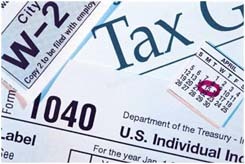
If you pay someone to prepare your tax return, choose that preparer wisely. Taxpayers are legally responsible for what's on their own tax returns even if prepared by someone else.
So, it is important to choose carefully when hiring an individual or firm to prepare personal returns. Most return preparers are professional, honest and provide excellent service to their clients. Here are a few points to keep in mind when someone else prepares your return:
- A Paid Preparer is required by law to sign the return and fill in the preparer areas of the form. The preparer should also include their appropriate identifying number on the return. Although the Preparer signs the return, you are responsible for the accuracy of every item on your return. In addition, the preparer must give you a copy of the return.
- Review the completed return to ensure all tax information, your name, address and Social Security number(s) are correct. Make sure that none of these spaces is left blank.
- Review and ensure you understand the entries and are comfortable with the accuracy of the return before you sign.
- Never sign a blank return, and never sign in pencil.
- If you have provided specific authorization in a power of attorney filed with the IRS, you may have copies of notices or refund checks mailed to your preparer or representative; but only you can sign and cash your refund check. For further information on Powers of Attorney, refer to Topic 311.
- A Third Party Authorization Check Box on Form 1040 allows you to designate your Paid Preparer to speak to the IRS concerning how your return was prepared, payment and refund issues and mathematical errors.
It's important for taxpayers to find qualified tax professionals if they need help preparing and filing their tax returns. Unqualified tax preparers may overlook legitimate deductions or credits that could cause clients to pay more tax than they should. Unqualified preparers may also make costly mistakes causing their clients to incur assessed deficiencies, penalties, and interest. Here are some suggestions to consider when hiring a tax professional:
- A paid preparer must sign the return as required by law.
- Avoid preparers who claim they can obtain larger refunds than other preparers. If your returns are prepared correctly, every preparer should derive substantially similar numbers.
- Beware of a preparer who guarantees results or who bases fees on a percentage of the amount of the refund. A practitioner may not charge a contingent fee (percentage of your refund) for preparing an original tax return.
- Understand that the most reputable preparers will request to see your receipts and will ask you multiple questions to determine your qualifications for expenses, deductions and other items. By doing so they have your best interest in mind and are trying to help you avoid penalties, interest or additional taxes that could result from an IRS examination.
- Choose a preparer you will be able to contact and one who will be responsive to your needs. Ask who will actually prepare the return before engaging services. Avoid firms where your work may be delegated down to someone with less training or some unknown worker. You should know exactly who works with your tax matters at all times and how to contact him or her; after all, you are paying for it. Determine if the preparer is exporting your return to a foreign country for preparation. Foreign countries do not have the same security and privacy laws as the United States nor is there any recourse should your information be compromised as a result of lax or nonexistent privacy procedures.
- Investigate whether the preparer has any questionable history with the Better Business Bureau, the state's board of accountancy for CPAs, the state's bar association for attorneys or the IRS Office of Professional Responsibility (OPR) for enrolled agents or the oversight agency in states that license or register tax preparers.
- Determine if the preparer's credentials meet your needs or if your state mandates licensing or registration requirements for paid preparers. As of 2008, California and Oregon are the only two states that regulate paid tax preparers. Is he or she an Enrolled Agent, Certified Public Accountant (CPA) or Tax Attorney? Only attorneys, CPAs and enrolled agents can represent taxpayers before the IRS in all matters including audits, collection actions and appeals. Other return preparers may represent taxpayers only in audits regarding a return that they signed as a preparer.
- Find out if the preparer is affiliated with a professional organization that provides or requires its members to pursue continuing education and holds them accountable to a code of ethics.
- Check IRS.gov for information regarding abusive shelters and other tax schemes and scams. Remember, if it sounds too good to be true, chances are it is.
- The IRS can help many taxpayers prepare their own returns without the assistance of a paid preparer. Before seeking a paid preparer, taxpayers might consider how much information is available directly from the IRS through the IRS Web site. Check out these helpful links:
Unfortunately, unscrupulous tax return preparers do exist and can cause considerable financial and legal problems for their clients. Examples of improper actions by unscrupulous preparers include the preparation and filing of false paper or electronic income tax returns that claim inflated personal or business expenses, false deductions, unallowable credits or excessive exemptions.
Tax evasion is both risky and a crime, punishable by up to five years imprisonment and a $250,000 fine. Remember, no matter who prepares a tax return, the taxpayer is legally responsible for all of the information on that tax return.
Report suspected tax fraud and abusive return preparers by completing Form 3949-A and mailing it or a letter with similar information to:
 Print
Print Email
Email







